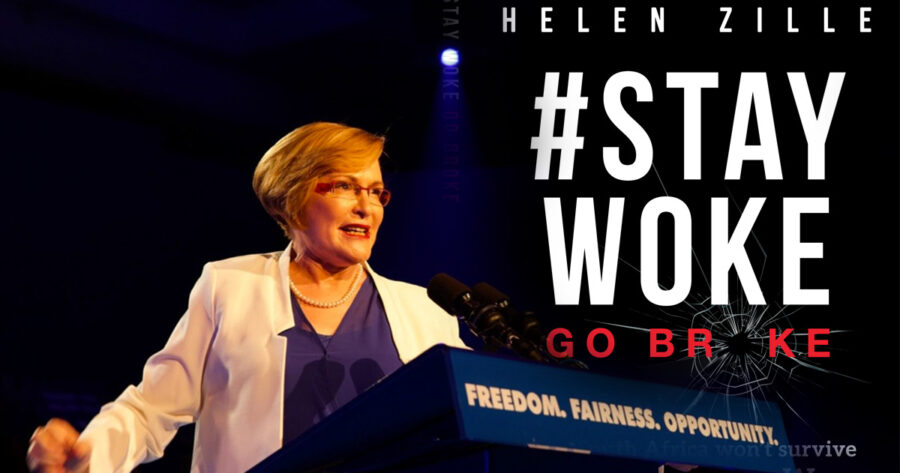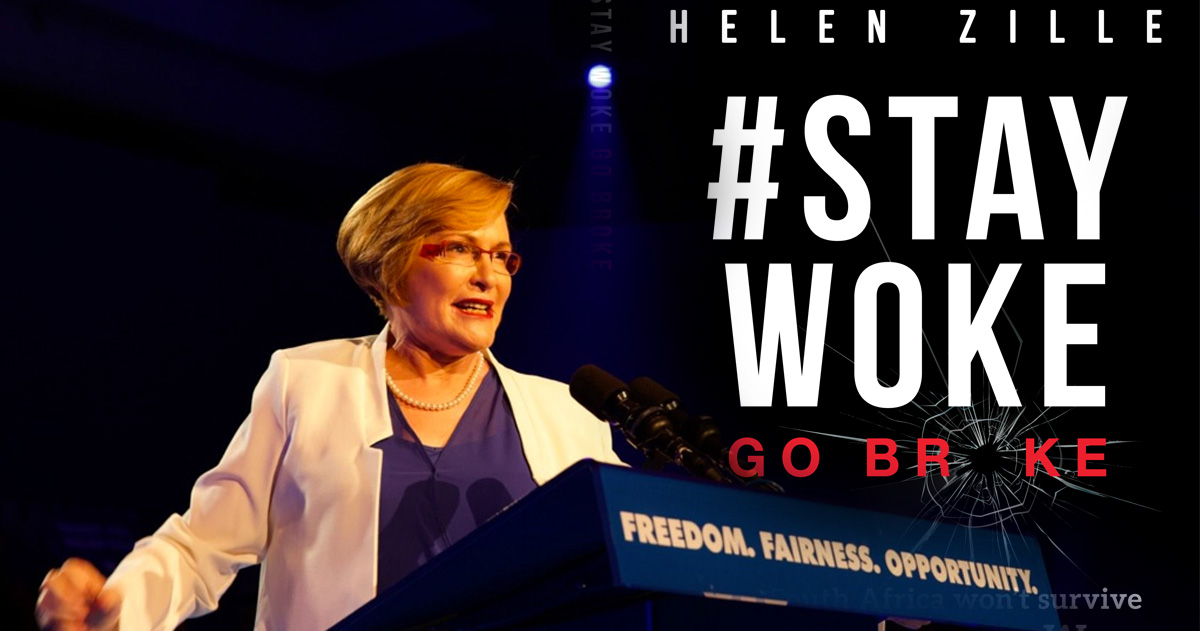
Review of Helen Zille’s #Stay Woke Go Broke: Why South Africa Won’t Survive America’s Culture Wars
Whatever one thinks of Helen Zille – and I think highly of her – no-one could suggest that she is behind the curve… writes MARTIN PLAUT. While politicians in Britain and the USA are only gradually coming to terms with the problem of “woke” politics, she has been highlighting the issue for years. Now these […]

Whatever one thinks of Helen Zille – and I think highly of her – no-one could suggest that she is behind the curve… writes MARTIN PLAUT. While politicians in Britain and the USA are only gradually coming to terms with the problem of “woke” politics, she has been highlighting the issue for years. Now these thoughts have been synthesised into this book.
It opens with a familiar, but nonetheless well-told story. It is of how Ashleigh Shultz, a young white waitress in Obz Café in Cape Town, was serving two young black customers. When she presented them with a bill, including a tip, one of them – Ntokozo Qwabe – handed the bill back with these words written on it in bold: “WE WILL GIVE TIP WHEN YOU RETURN THE LAND.”
Ashleigh burst into tears.
As someone who had moved out of her flat because her two waitressing jobs did not pay her half of the rent, let alone help her support her mother who needed chemotherapy for advanced cancer, she was understandably devastated by being treated in this way. The tips were essential; not a luxury.
Ntokozo Qwabe, on the other hand, was a member of South Africa’s new elite. He had been educated at one of the best schools and gone on to benefit from a Mandela Rhodes bursary to Oxford University.
She was poor. He was privileged. But because she was white and he was black she was – in the crazy world of “woke” politics – inevitably in the wrong. The colour of her skin trumped all other considerations.
Luckily generous South Africans, alerted to Ashleigh’s plight, came to her aid. They raised funds so that she would not only pay for her mother’s care, but make donations to charities, and continue with her studies.
If this was just a single instance it would be a moving story. But it is not.

As Zille makes clear, “woke” culture has come to dominate sections of thought on the international left. It can be traced back, she argues, to the assault on the central tenants of the Enlightenment (1685 – 1815) which challenged theocratic and political dogma. Reason was the Enlightenment’s lodestar. Individuals were judged by their abilities and not their class, religion, colour or creed.
This perspective is enshrined in the Freedom Charter’s famous claim that South Africa belongs to “all who all who live in it, black and white.” And – as is often forgotten – it goes on to stress “that only a democratic state, based on the will of all the people, can secure to all their birthright without distinction of colour, race, sex or belief.”
The fact that more than a quarter of a century after the end of apartheid, South Africans still carry racial designations tells you how far the nation still has to go to achieve this dream.
Zille traces “woke” culture back to American Critical Race Theory. This was an attempt to come to terms with the tragic legacy of slavery, but over time morphed into a grotesque system of control. The author asks: “How has a movement that claims to oppose bigotry, deployed as its weapon of choice, a modern form of the medieval witch-hunt, known as ‘cancel-culture’, using social media to manufacture outrage against ‘offending’ individuals and taking social ostracism to pre-Enlightenment extremes?”

It is a pertinent question. Its more extreme proponents have gone out of their way to trash a range of values that are dearly held by most ordinary men and women. Family, patriotism, pride in achievements – scholastic or athletic – can, and are, all open to attack.
Those who resist the “woke” certainties are derided as neo-liberals, fascists, racists or transphobic. In Britain and America anyone who resists these views can be “no-platformed” at universities and driven off-campus.
This is not just a problem for those who suffer this intolerance, it is very troubling for the democratic left. Donald Trump’s Republican Party and Boris Johnson’s Conservative Party see the debate as fertile ground for their politics.
Rather than fighting on their policies, the parties of the right now see visceral politics as a very fruitful battleground. They have correctly understood that most voters have little time to sift through the details of public policies. Rather, elections are won by cramming the essence of the message into as few words as possible.
“Take Back Control” was the winning slogan in the Brexit campaign that saw Britain leave the European Union. “Keep America Great” was supported by more than 74 million Americans and almost saw Trump back in the White House.
No wonder the flag, or – in the case of Britain – the Royal Family, are key symbols manipulated to win votes. Is it any surprise that Boris Johnson is commissioning a new Royal Yacht – the “Prince Philip” – at a cost of £200 million?
This is the ground the right wants to fight on and attacking “woke” politics is grist to their mill. Unless the democratic left can turn its back on these excesses it will be doomed to failure. Re-connecting with the hopes and fears of ordinary voters is the only road to electoral success.
Zille ends by posing this issue: “The big question is how to ensure restitution for past wrongs without resurrecting the politics that gave rise to injustice and conflict in the first place – race classification, racial domination and preferencing, and the denial of individual liberty.”
Across most of Africa this question has been answered with the politics of ethnicity, whether it is a ‘tribe’ or another form of collective identity.
In country after country leaders hang on for decade after decade, to ensure that his (and the overwhelming majority of African leaders are men) group continues to benefit from the resources of the nation. South Africa – as the most industrially advanced country on the continent – has a chance to reject this approach and allow people to be judged on their merits. So far, most have chosen not to take this path, continuing to vote for the ANC to secure their tiny share of the national cake.
Can the DA show that there’s a better, more effective way of running the country that does not threaten the majority with the loss of these vital benefits? That is the challenge that lies ahead.
To order #StayWoke: Go Broke:
- In South Africa: #StayWoke: Go Broke | takealot.com
- In the UK: #StayWoke: Go Broke eBook on Amazon.co.uk: Kindle Store
- In the US: #StayWoke: Go Broke: Why South Africa won’t survive America’s culture wars (and what you can do about it) – Kindle edition on Amazon.com
Reviewed by MARTIN PLAUT, a Senior Research Fellow at the Institute of Commonwealth Studies and former Africa Editor for the BBC World News Service. Plaut is author of Dr Abdullah Abdurahman eBook and co-author of Understanding South Africa.